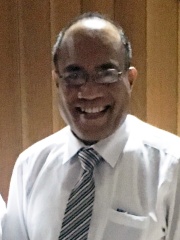
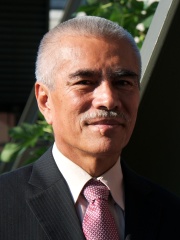
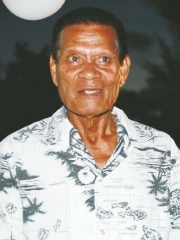
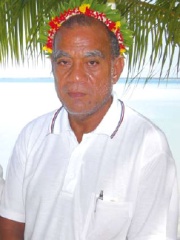
The Most Famous
POLITICIANS from Kiribati
This page contains a list of the greatest I-Kiribati Politicians. The pantheon dataset contains 19,576 Politicians, 5 of which were born in Kiribati. This makes Kiribati the birth place of the 193rd most number of Politicians behind Brunei, and The Gambia.
Top 5
The following people are considered by Pantheon to be the most legendary I-Kiribati Politicians of all time. This list of famous I-Kiribati Politicians is sorted by HPI (Historical Popularity Index), a metric that aggregates information on a biography's online popularity.

1. Taneti Mamau (b. 1960)
With an HPI of 64.15, Taneti Mamau is the most famous I-Kiribati Politician. His biography has been translated into 32 different languages on wikipedia.
Taneti Maamau (born 16 September 1960) is an I-Kiribati politician who has served as the fifth president of Kiribati since 2016. A member of the Tobwaan Kiribati Party, his policies are targeted at strengthening Kiribati's weak economy and alleviating social issues. His government announced the Kiribati Vision for 20 Years (KV20), which plans to develop the tourism and fishing industries with aid from foreign investors. Maamau's government stopped recognizing Taiwan in favour of closer ties with China, drawing concern from within his own party, the opposition and Western countries. He dismissed his predecessor's "Migration With Dignity" climate change policy. After his reelection in 2020, Maamau unveiled plans to combat rising sea levels by raising Kiribati's islands. This would be partly through dredging and supported by aid from foreign allies such as China. In 2022, Maamau's government was widely criticized for causing a constitutional crisis by suspending all superior court judges. He was re-elected in 2024 to serve a third and final term.

2. Anote Tong (b. 1952)
With an HPI of 63.02, Anote Tong is the 2nd most famous I-Kiribati Politician. His biography has been translated into 40 different languages.
Anote Tong (simplified Chinese: 汤安诺; traditional Chinese: 湯安諾; pinyin: Tāng Ānnuò; born 11 June 1952) is an I-Kiribati environmental activist and former politician for the Pillars of Truth party with half Chinese heritage, who served as the fourth president of Kiribati, from 2003 to 2016. He won the election in July 2003 with a slim plurality of votes cast (47.4%) against his older brother, Harry Tong (43.5%) and the private lawyer Banuera Berina (9.1%). The elections were contested by the opposition, due to allegations of electoral fraud but the High Court of Tarawa had confirmed that there was no fraud. He was re-elected on 17 October 2007 for a second term (64%). In 2012, Tong was reelected for a third term, although with a significantly smaller percentage than in the previous two elections. Tong is primarily known abroad for his efforts to raise "global awareness on the threat posed by climate change".

3. Teatao Teannaki (1936 - 2016)
With an HPI of 56.33, Teatao Teannaki is the 3rd most famous I-Kiribati Politician. His biography has been translated into 17 different languages.
Teatao Teannaki (15 June 1935 – 11 October 2016) was an I-Kiribati political figure who served as the second president of Kiribati from 1991 until 1994. He was first elected to represent Abaiang in the House of Assembly of the Gilbert Islands. Teatao Teannaki, Minister of State in the previous government of Chief Minister Naboua Ratieta, became Minister for Education, Training and Culture in March 1978. At independence on 12 July 1979, Tabai immediately nominated Teannaki as vice-president. He served as vice president of Kiribati under the three mandates of Sir Ieremia Tabai. He would also serve as the Minister of Home Affairs in 1987, and as Minister of Finance from 1987 to 1991. Replacing Babera Kirata, suddenly dead before the general election, he was narrowly elected to replace Tabai as the President of Kiribati on behalf of the National Progressive Party of Kiribati from 8 July 1991 until 1 October 1994. It is said that Tabai continued to exert political influence in the Kiribati government throughout Teannaki's term. Teannaki also served as Foreign Minister beginning in 1992. He was succeeded by Teburoro Tito after defeat in a September 1994 election. Teannaki was at the helm of the National Progressive Party as of July 2015. Teannaki died in a maneaba namely Ueen Abaiang during a meeting with the Unimane of Abaiang Called " te Ie nao" (following a heart attack on 11 October 2016. at the age of 80.

4. Ieremia Tabai (b. 1949)
With an HPI of 54.48, Ieremia Tabai is the 4th most famous I-Kiribati Politician. His biography has been translated into 19 different languages.
Ieremia Tienang Tabai (born 16 December 1949) is an I-Kiribati politician who served as the first president of Kiribati from 1979 to 1991. He previously served in the equivalent role, chief minister, under the colonial government from 1978 to 1979. Tabai returned to the House of Assembly in 1998 and represented Nonouti as of his re-election in 2024. After attending university in New Zealand, Tabai worked in the Ministry of Finance for a year before deciding to enter politics. He was elected to the House of Assembly in 1974 and became the leader of the opposition. Tabai defeated the incumbent Naboua Ratieta to become chief minister in the 1978 election, effectively putting him in charge of independence negotiations, and he became the president of Kiribati upon independence in 1979. He was elected to another term as president in 1982. His term ended abruptly after he tied an unsuccessful bill to a motion of no confidence, but he retained the presidency in the resulting 1983 election. In the early years of his presidency, Tabai made national self-sufficiency central to his agenda. Tabai signed a fishing agreement with the Soviet Union in 1985, triggering both domestic and international protest. He ran for re-election in 1987, but opposition member Harry Tong filed a legal challenge, saying that Tabai's elections in 1978, 1982, and 1983 meant that Tabai was term-limited. It was determined that the 1978 election was for a colonial position and it did not count against his term limit. Tabai then won re-election. He was term-limited in 1991, so he successfully campaigned for his vice-president Teatao Teannaki to be the next president. Tabai became Secretary General of the Pacific Islands Forum in 1992, holding the office until 1998. He then returned to parliamentary politics. Tabai founded two media outlets over the next few years: the Newstar newspaper, which was the country's first independently-owned outlet, and a radio station. As an assemblyman, he has opposed Kiribati's relations with China and spoken in favour of smaller family sizes to limit the effects of overpopulation and climate change.
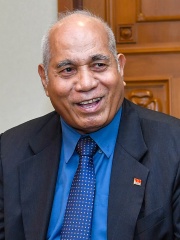
5. Teburoro Tito (b. 1953)
With an HPI of 54.15, Teburoro Tito is the 5th most famous I-Kiribati Politician. His biography has been translated into 19 different languages.
Teburoro Tito (born 25 August 1953) is an I-Kiribati politician and diplomat who served as the third president of Kiribati from 1994 to 2003.
People
Pantheon has 5 people classified as I-Kiribati politicians born between 1936 and 1960. Of these 5, 4 (80.00%) of them are still alive today. The most famous living I-Kiribati politicians include Taneti Mamau, Anote Tong, and Ieremia Tabai. The most famous deceased I-Kiribati politicians include Teatao Teannaki.
Living I-Kiribati Politicians
Go to all RankingsTaneti Mamau
1960 - Present
HPI: 64.15
Anote Tong
1952 - Present
HPI: 63.02
Ieremia Tabai
1949 - Present
HPI: 54.48
Teburoro Tito
1953 - Present
HPI: 54.15

